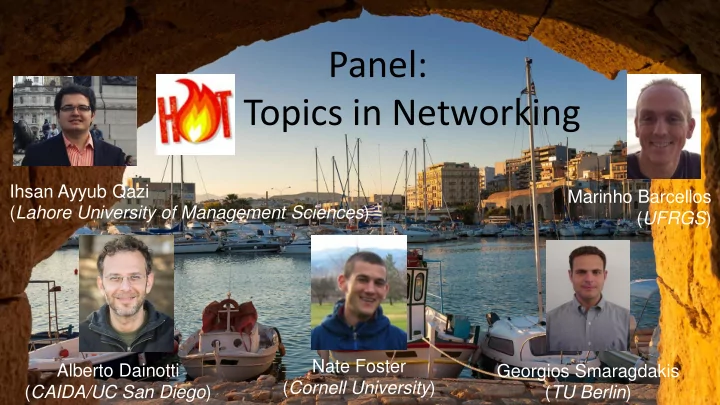

Panel: Hot Topics in Networking Ihsan Ayyub Qazi Marinho Barcellos ( Lahore University of Management Sciences ) ( UFRGS ) Nate Foster Alberto Dainotti Georgios Smaragdakis ( Cornell University ) ( CAIDA/UC San Diego ) ( TU Berlin )
ALBERTO DAINOTTI Research Scientist CAIDA, UC San Diego Research Interests: Internet Measurement and Security: • Network Outages, DoS, Botnets, Cyber-warfare, BGP http://www.caida.org/~alberto/ Hijacking, … Lots of “infrastructure” development: • • https://bgpstream.caida.org https://ioda.caida.org
SOME IDEAS 1) Old topics can still be hot! - questions stay the same, the answers change E.g., understanding the Internet infrastructure 2) Multidisciplinary studies are both hot and fun - Joint investigations with social, political, economical scientists - Increasing funding encouraging multidisciplinary work - Examples: - Use of DoS attacks as a mean of either repression or protest in autocracies. - Internet blackouts ordered by governments (human rights, economic impact) - Cyberwarfare: how the macroscopic Internet topology in a country can be more/less susceptible to high-impact targeted attacks by state actors 3) Hot is also helping the others/working with a broader community Thinking bigger than one paper and 2 co-authors. - Developing an open source tool - Organizing/participating in a hackathon - Work on making results easily reproducible
2017 – today: Professor at TU Berlin , 2017 – today: European Research Council awardee 2014 – today: Research Associate, MIT Computer Science and Artificial Intelligence Laboratory 2017 – today: Visiting Researcher at Akamai Technologies 2017– today: Researcher, MIT Internet Policy Research Initiative 2014 – 2017: Marie Curie Fellow at MIT CSAIL 2011 – 2013: Co-founder of a DT Spin-off in Berlin 2009 – 2014: Senior Researcher at Deutsche Telekom Laboratories and TU Berlin 2008: Internship at Telefonica Research 2003 – 2008: PhD student at Boston University 1998 – 2003: Diploma student at TU Crete 1
- Measurements for Regulation and Audit - Web Privacy - Internet Resiliency and Cyber-attacks - Network Infrastructures for Self-driving cars/Drones/UVAs etc. - Networking Architectures to support AI/ML - SPACE X and other alternative communication technologies Tips: - Avoid Cold Topics (and very crowded topics!); be first and they will follow! - Do not forget to attend my keynote at the end of the Workshop for a full list of Hot Topics 2
Panel: “Hot Topics in Networking” ACM CoNEXT Student Workshop, 2018 Ihsan Ayyub Qazi LUMS
Who am I? Computer Science Professor at LUMS, Pakistan (~7 years) ACM CoNEXT 2018 Google Faculty Award, 2018 IEEE INFOCOM’17 ACM CoNEXT 2018 IEEE/ACM Trans. on Net.’17 ACM SIGCOMM CCR’18 ACM HotNets’16 Cloud ICTD & ACM IMC’16 ACM SIGCOMM’14 ACM CoNEXT’16 Computing & … Wireless IEEE INFOCOM’14 Datacenters Networks … Internet ACM SIGCOMM’18 Censorship & ACM HotNets’17 Privacy ACM HotNets’15 ACM IMC’14 …
Finding “good” research problems • Impactful research often involves taking risks Take the • Courage, patience, openness, humility,… plunge! • How do I go about finding problems? • Observation and experience (e.g., YouTube censorship) Connect • Making connections across disciplines (e.g., Course at CMU) the dots! • Reading broadly and talking to people (e.g., Facebook Free Basics) • Keeping an eye on technology (and other) trends (e.g., Slow devices) • Research tastes Find your • Working in an active research space – what is my uniqueness ? uniqueness! • Solving “future” problems – will this hold up ? • “Hot Topics in Networking” Courage to • Plenty of ”hot” areas in networking let go! • Caveat: Gold rush
• Marinho Barcellos, 53 • PhD Newcastle University, UK 1998 • BT Research Labs, U Manchester 2003-2004 • UNISINOS University 1999-2008, PUCRS University 2008, UFRGS - 2010-now - Reader, UNAL invited professor • Head of UFRGS research group • CNPq - Researcher Level 1 • SIGCOMM diversity & outreach
some of the collaborations KTH - Sweden, LiU - Sweden KAUST - Saudi Arabia University of Waikato - New Zealand Marinho Barcellos - marinho@acm.org 2
how to fi nd "hot topics” in networking • learn how to identify " cold topics " (hard... DC was deemed cold already in sigcomm 14). 2nd-tier, etc. • HotNets for green stu ff to make you think out of the box • Jon’s re-heating lessons : extrapolate or invert; drawn inspiration from other areas (eg sociology); new technology enablers • new workshops in important conferences. look who's contributing to the pc and as authors • follow the pages of groups and people you admire Marinho Barcellos - marinho@acm.org � 3
examples of hot areas • Self-Driving Networks: measure, optimize and control • AI (Big Data Analytics and Machine Learning) for networking • Networking to optimize AI (Network Meets AI & ML) • Network programmability, Softwarized Networks, InT • Security in Softwarized Networks • IoT Security and Privacy, Internet measurements for cybersecurity, large-scale attacks a ff ecting (b)millions • LEO satellite array to provide low-latency routing through space Marinho Barcellos - marinho@acm.org � 4
more examples • In-network computing, o ffl oading processing to network • Mobile Edge Communications • Kernel Bypassing Networks (RDMA, SmartNICS, DPDK) Marinho Barcellos - marinho@acm.org � 5
summary • the most challenging problem is to fi nd early on the hot topic. should not arrive late. write history, not merely read • look for topics in new workshops (backed by “reliable" people) • Self-Driving Networks, AI for networking & vice-versa, Softwarized Networks, Security, Telemetry, IoT S&P, Internet measurements for cybersecurity, new satellite-based networks • and don’t forget why you’re doing all this, so pick a hot topic you will love Marinho Barcellos - marinho@acm.org � 6
Nate Foster Background • BA Williams (2001) • MPhil Cambridge (2008) • PhD UPenn (2009) • Postdoc Princeton (2009-2010) • Faculty Cornell (2010-present) • Sabbatical Barefoot & Stanford (2016-2017) Interests Programming language design and implementation Research Highlights • Bidirectional Languages: every program can be run both forwards, from input to output, and backwards, from output back to input (lenses, Boomerang) • Network Programming: high-level and declarative languages for programming network routers and switches (Frenetic, Pyretic, NetKAT, P4 etc.)
Recommend
More recommend